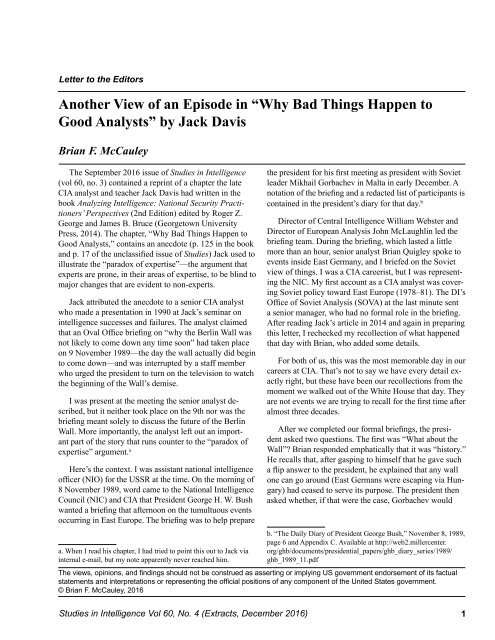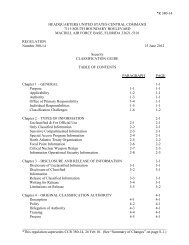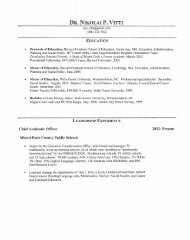extracts-studies-dec-2016
extracts-studies-dec-2016
extracts-studies-dec-2016
You also want an ePaper? Increase the reach of your titles
YUMPU automatically turns print PDFs into web optimized ePapers that Google loves.
Letter to the Editors<br />
Another View of an Episode in “Why Bad Things Happen to<br />
Good Analysts” by Jack Davis<br />
Brian F. McCauley<br />
The September <strong>2016</strong> issue of Studies in Intelligence<br />
(vol 60, no. 3) contained a reprint of a chapter the late<br />
CIA analyst and teacher Jack Davis had written in the<br />
book Analyzing Intelligence: National Security Practitioners’<br />
Perspectives (2nd Edition) edited by Roger Z.<br />
George and James B. Bruce (Georgetown University<br />
Press, 2014). The chapter, “Why Bad Things Happen to<br />
Good Analysts,” contains an anecdote (p. 125 in the book<br />
and p. 17 of the unclassified issue of Studies) Jack used to<br />
illustrate the “paradox of expertise”—the argument that<br />
experts are prone, in their areas of expertise, to be blind to<br />
major changes that are evident to non-experts.<br />
Jack attributed the anecdote to a senior CIA analyst<br />
who made a presentation in 1990 at Jack’s seminar on<br />
intelligence successes and failures. The analyst claimed<br />
that an Oval Office briefing on “why the Berlin Wall was<br />
not likely to come down any time soon” had taken place<br />
on 9 November 1989—the day the wall actually did begin<br />
to come down—and was interrupted by a staff member<br />
who urged the president to turn on the television to watch<br />
the beginning of the Wall’s demise.<br />
I was present at the meeting the senior analyst described,<br />
but it neither took place on the 9th nor was the<br />
briefing meant solely to discuss the future of the Berlin<br />
Wall. More importantly, the analyst left out an important<br />
part of the story that runs counter to the “paradox of<br />
expertise” argument. a<br />
Here’s the context. I was assistant national intelligence<br />
officer (NIO) for the USSR at the time. On the morning of<br />
8 November 1989, word came to the National Intelligence<br />
Council (NIC) and CIA that President George H. W. Bush<br />
wanted a briefing that afternoon on the tumultuous events<br />
occurring in East Europe. The briefing was to help prepare<br />
a. When I read his chapter, I had tried to point this out to Jack via<br />
internal e-mail, but my note apparently never reached him.<br />
the president for his first meeting as president with Soviet<br />
leader Mikhail Gorbachev in Malta in early December. A<br />
notation of the briefing and a redacted list of participants is<br />
contained in the president’s diary for that day. b<br />
Director of Central Intelligence William Webster and<br />
Director of European Analysis John McLaughlin led the<br />
briefing team. During the briefing, which lasted a little<br />
more than an hour, senior analyst Brian Quigley spoke to<br />
events inside East Germany, and I briefed on the Soviet<br />
view of things. I was a CIA careerist, but I was representing<br />
the NIC. My first account as a CIA analyst was covering<br />
Soviet policy toward East Europe (1978–81). The DI’s<br />
Office of Soviet Analysis (SOVA) at the last minute sent<br />
a senior manager, who had no formal role in the briefing.<br />
After reading Jack’s article in 2014 and again in preparing<br />
this letter, I rechecked my recollection of what happened<br />
that day with Brian, who added some details.<br />
For both of us, this was the most memorable day in our<br />
careers at CIA. That’s not to say we have every detail exactly<br />
right, but these have been our recollections from the<br />
moment we walked out of the White House that day. They<br />
are not events we are trying to recall for the first time after<br />
almost three <strong>dec</strong>ades.<br />
After we completed our formal briefings, the president<br />
asked two questions. The first was “What about the<br />
Wall”? Brian responded emphatically that it was “history.”<br />
He recalls that, after gasping to himself that he gave such<br />
a flip answer to the president, he explained that any wall<br />
one can go around (East Germans were escaping via Hungary)<br />
had ceased to serve its purpose. The president then<br />
asked whether, if that were the case, Gorbachev would<br />
b. “The Daily Diary of President George Bush,” November 8, 1989,<br />
page 6 and Appendix C. Available at http://web2.millercenter.<br />
org/ghb/documents/presidential_papers/ghb_diary_series/1989/<br />
ghb_1989_11.pdf<br />
The views, opinions, and findings should not be construed as asserting or implying US government endorsement of its factual<br />
statements and interpretations or representing the official positions of any component of the United States government.<br />
© Brian F. McCauley, <strong>2016</strong><br />
Studies in Intelligence Vol 60, No. 4 (Extracts, December <strong>2016</strong>)<br />
1




